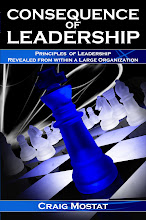Leadership is the same as it was 1000 years ago. While there are hundreds of ways to define it, and can be applied almost anywhere and anytime, the principles of leadership remain the same. These same principles were employed 2000 years ago by Jesus Christ; over 200 years ago by George Washington; and by Gandhi, Churchill and King in the past century. Sadly, men like Hitler also used these same principles. Leaders, great and small, will be using these same unchanging principles, in the future. Leadership is like mathematics. The inputs or variables can be changed, but using the right formula – that never changes - will always deliver an expected result.
Regardless of the definition and application, there are a couple of undeniable facts about leadership, which are always present:
- Leadership always involves people
- Leadership must involve a vision, expected end or result, or goal
While the first point seems to be obvious, if we are to look inside any organization, I guarantee that you will find at least one (probably many) that do not realize this. Involving people, means seeing every person as an individual with hopes, dreams, strengths and value. The opposite and unfortunate view of people is one of pawns, machines, assets and parts of the business that are easily expendable.
If the above is true - that the principles of leadership are constant and unchanging - and I submit that it is, why do so many fail to understand them? Should we not all be able to simply view the lives, habits and principles of other great leaders that have gone before us and then emulate what they have done? Countless books have been written on the leaders of the past. We quote them constantly. We study everything about them. Yet despite all of this, a massive void in leadership exists in many organizations and businesses.
I remember when the book Good to Great by Jim Collins came out. The executives in the organization that I worked for were touting it as one the greatest business books ever written. They were constantly talking about the ideas and principles that the book identified. I read the book – which I also testify to being one of the greatest business books ever read. Consequently, this book would be one of the catalysts for the beginning of the end for me in this particular organization.
The ideas and principles in Good to Great were illuminating and profound. They made absolute sense. Intuitively I knew them to be true; when I read them, they were obvious – there was no dispute. I was able to connect the dots between the problems within my own organization and could now clearly see the solutions. Even more encouraging was the fact that the senior leadership had latched on to this book and were proclaiming the principles. Wow – things would get better from here on – or so I thought.
Nothing changed. I later realized that only certain principles from those companies that went from good to great as outlined in the book were being declared while others were completely disregarded. Regrettably, even those ideas that were embraced turned out to be "flavors of the day". It doesn't really matter what you know if "how you are" can't deliver it. It was a problem of character in the leadership.
Nevertheless, I was ruined. I now had a much clearer picture of how organizations should work – what the inside of a great organization looks like. Ignorance was bliss, but I could no longer be satisfied with the status quo. I spent my remaining years with that organization doing everything I could to lead positive, effective leadership principles – both upwards and downwards. I was naïve: the challenge was impossible to overcome from someone that was not at the top of the organization.
The question still remains: Why can some easily grasp the concepts of effective leadership, while it is impossible for others? From the study of past leaders – both the good and the bad, I have concluded that it has nothing to do with education, IQ, skills, ability, strengths, charisma or looks. I believe that it comes down to one simple aspect. Humility. As I define in my book - Consequence of Leadership:
Humility is best defined as being without arrogance, showing modesty and not elevating ones self above anyone else in status. Humility is not depreciating or devaluing oneself in an attempt to bring others up. It is appreciating others as much as you appreciate yourself.
Leaders of the past that have accomplished great and positive achievements, valued others as much as they valued themselves, and their objective, vision or goal transcended their own personal ambition. They exhibited humility.
In order for leaders in the future to achieve great and positive visions and goals, they will have to do the same.



